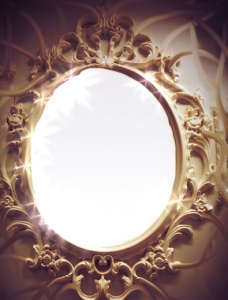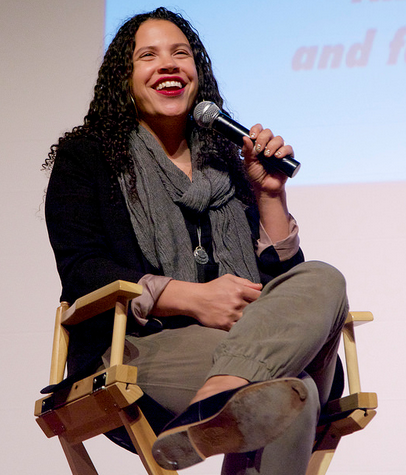Prompt: For this week our task was to take the story about how evil comes into the world, written by Leslie Silko and retold by King in his book “The Truth About Stories” and to make the story our own.
Ben Okri- “We live by stories, we also live in them. We are living the stories planted in us early or along the way, we are also living the stories we planted-knowingly or unknowingly- in ourselves (…) If we change the stories we live by, quiet possibly we change our lives.” (King 153)
My version: Once upon a time, a little boy went to his first day of school. He arrived in the brightly colored kindergarten classroom, holding his mom’s milky-white hand. He excitedly glanced around the room and realized that the other children were staring at him with questioning looks. He thought maybe it was because he was so tall for his age. After calendar time, recess rolled around. With his Minecraft lunchbox in his hand, he ventured out into the sun. Usually he would want to go play basketball, but eager to make new friends he spotted a group of kids sitting in a circle on the field near the blacktop. Their eyes sparkled with laughter, as they joked around. He walked up, anticipation filling him with every step. His voice faltered as he asked what they were doing. In unison they whispered, “truth or dare” scared that a teacher might hear. Asking if he could join, they agreed, and he sat down in the huddle of small children.
From a boy eating an ant to a girl revealing her crush, there was constant entertainment and glee. Finally, it was his turn to go. His voice faltered as he picked truth. All eyes were on him as he awaited the question. The ant eating boy was given the task at hand and thought it over for a second, whispering to his friends for confirmation. He hesitated and finally asked, “why are you different than your mom? Are you adopted?” The question crashed against him like a glass breaking. He clamped his hand against his ears and shouted, “It doesn’t sound so good, take the story back, take the story back”.
With tears in his eyes, he ran towards the bathroom trying to escape his past, present, and future, somehow hoping to seek shelter in isolation against the story. He walked into the cold bleak bathroom, facing the stained mirror. He wiped away his tears too afraid to look at himself for what he really was. Eventually curiosity took over, and he was forced to look up. Chocolate brown skin filled his view, and he felt denial slowly chipping away. For confirmation he tapped on the mirror to check that the image was authentic, not just a picture in a frame. He gazed for a second, and with new found clarity, he knew a new chapter had been turned. For once a story is told, it cannot be called back. Once told, it is loose in the world. He started to walk back to his classroom finding comfort in his own skin.
Commentary: I work in a middle school and my story is based on stories that I have heard about students experiences with adoption. They reminded me that not all stories are evil or harmful, rather they guarantee that one is living a authentic life as stories hint at human imperfections. I told the story to both of my sisters, as one works in an elementary school and the other attends a middle school. I found that I adapted the story to make it more relevant by using familiar settings and popular fads.
The common thread of denial plays a part in the stories we tell ourselves. My story touches on personal denial, but I find it interesting to look at how groups of people can participate in perpetuating a specific story. The documentary film “Little White Lie” depicts filmmaker Lacey Schwartz who grew up in a white Jewish family in New York, but had darker skin than her parents and siblings. Her family said that she inherited her dark skin from her Sicilian grandfather. The secret was described as a “600 pound gorilla in the room” and at age 18 her mom told her that she was a result of an affair with an African American man. The film illustrates that stories can create a duality of identity in what we tell ourselves and how others see us. The danger of course, is that it can affect the past, present, and future. Luckily, Lacey embraced her identity. However, it begs the question of what role keeping family secrets play in our lives, for the better or the worse?
Works Cited:
Belton, Danielle. “3 Black Adoptees on Racial Identity After Growing Up in White Homes.” The Root . N.p., 27 Jan. 2015. Web. 29 May 2015.
King, Thomas. The Truth About Stories:A Native Narrative. Toronto: House of Anasi, 2003. Print.
Lacey Schwart. Flickr. Web. 29 May 2015. <www.flickr.com>.
Little White Lie Official Trailer. Narr. Lacey Schwartz. Film Fesitvals and Indie Films, 2014. Web. 28 May 2015. <https://www.youtube.com/watch?v=qxHLpgYwcVY>.
Mystical Mirror. 2014. Web. 29 May 2015. <www.pixabay.com>.



What an interesting take on the prompt! I liked how you set the story in a contemporary, everyday setting. Indeed, figuring out what is right, wrong, and weird in the world is a personal journey for everyone. It leads us to ask the question of when exactly do humans acquire the ability to recognize and commit evil? Are we born with evil in us, or is evil learned? Also, can it be fair to say that evil is in the eye of the beholder? While some kids might find adoption to be strange and unsettling, other kids might have an easier time accepting it as a normal (actually, good!) thing to do.
Hi Charmaine. Thanks for the comment, and sorry for my late reply!
Like you mentioned, I think for the most part evil can be in the eye of the beholder. However, i do find it interesting how some groups mutually agree upon what is evil, even though it may be fictional and not based in reality. A horrendous example of this, is the Holocaust, and the propaganda that the Nazi’s spread against the Jews. In this case, evil was learnt by indoctrinating the youth, with programs such as Hitler Youth where they were educated on the so called “inferior” race. Thus, I think that we can both be born with evil and we can learn it. It seems to be an argument very similar to the nature vs. nurture debate!
🙂
Hi Sarah!
I have to admit, after reading your adaptation I felt really sad and yet inspired as well! Definitely moving. I find the topic of white lies which you have brought up to be a very conflicting one indeed. Reflecting on my own post, I was so confident simply categorizing misdoings as sins within the scope of the ‘seven deadly sins’. However, I had not accounted for the grey area which is definitely important and very relevant especially in every day life. In response to your question I believe that secrets in general are damaging although necessary, especially those which hit closer to home. Similar to the conflict public figures face between public and private lives, the every day man also suffers having to make this decision. Thank you for raising this point especially in relation to the sensitive nature of something like adoption!
Hi Debra,
Thanks for all the great points. I totally agree with you when you state that secrets belong in a grey zone, as they are both necessary, but also damaging. Similar to the documentary that I mentioned (“Little White Lie”) there is a Canadian version of this called “Stories We Tell” by actress Sarah Polley. The film focuses on the revelation that Sarah was a product of an extramarital affair. In the documentary she calls her interview subjects “the storytellers” which suggests that this family secret does not belong to anyone in particular. It is interesting to see how the secrets purpose which was to protect Sarah actually took on a life of its own. The secret transitioned from the private to the public sphere, evident in the fact that some of the storytellers included family friends and colleagues of her mother. Also, she stated that journalists knew the identity of her biological father. The film really emphasizes the wide ramifications that secrets can have on us, not just on those that it specifically pertains to.
Trailer for “Stories We Tell”: https://www.youtube.com/watch?v=ytq4VZ2Nyxg
🙂
Hey there!
What an awesome take on the story. What I love about your take is that it is so relevant to our society today. While my story is more plot-focused and involves flat characters, your story gives life to your characters and engages their differences as humans. It’s interesting that in your story the truth is what is evil. It’s almost like the truth (while it’s usually seen as something good) is instead seen as something poisonous or corrosive to the boy’s stability. He taps the mirror to see if his reflection is true, because falsehood would be more settling for him. It is his ignorance that provides him with bliss, which is also something that I’m sure most people can relate to.
Cheers!
-Hailey
Hi Hailey.
Thanks for the great analysis. Your take on the story is exactly what I hoped to convey. The connection between truth and evil that you discussed is spot on. I also think that his own perceived imperfection (being different than others) is what contributes to this conception of evil. The final recognition of of his imperfection will allow his own story to develop as there will be a greater acceptance of the past,present, and future. The development of storytelling and imperfection is nicely stated by Nigerian storyteller Ben Orki who thinks that “the fact of storytelling hints at a fundamental human unease, hints at human imperfection. Where there is perfection there is no story to tell”.
🙂
Hi Sarah,
I enjoyed this story, its modern setting is unique (most stories of evil veer for origin tales, or creation periods). It was surprising, and realistic how no act was intended to be evil. Despite the alarming nature of the question, the boy managed to find comfort in this realization. It also points out how much of an impact stories have on people, and what happens when a story of identity is challenged. The morality of white lies is really questioned in this story, at their most base level. Should the parents have told their child he was adopted earlier on, so that he wouldn’t have to face the emotional turmoil alone? Were they right in protecting their son by withholding the truth? It’s hard to say. No one part or character in this story alone is evil, but their sum result was. It also demonstrates the capacity for one to move past misdeed, and potentially grow from the experience.
-Landon
Hi Landon,
I chose to do this story in a modern setting, because it was easier for me to write as I work in a school and am very familiar with the interactions and dialogues that occur. You mentioned that white lies provoke a moral dilemma, and I feel that this is what contributes to make them so interesting to discuss. I also think that this concept can relate to everyone on a personal level. In my case, my mom at the age of 40 finally discovered that her brother was given away and eventually adopted. She had grown up thinking she was the oldest of two other siblings, when in reality she had an older brother. The lies that her parents told her, had wide ramifications for everyone involved. However, as you mentioned, there is an ability to move past an experience, because of a recognition that that this lie was in the center of a moral conflict between truth and protection.
🙂